An Operational Perspective of Smuggling Tactics
CAPT Luke Ivan, USGG, Naval War College
Download PowerPoint Presentation
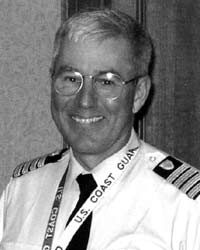 Captain
Ivan discussed USCG Maritime Law Enforcement in the area of narcotics,
fisheries, illegal immigrants and homeland security. He stressed
the point of view that “you want to stop them before they get
to shore.” Captain
Ivan discussed USCG Maritime Law Enforcement in the area of narcotics,
fisheries, illegal immigrants and homeland security. He stressed
the point of view that “you want to stop them before they get
to shore.”
The methods of drug enforcement involved choke points, hidden compartments,
air drops, LEDETS (law enforcement detachment), go-fasts (high speed
vehicles), and helicopter interception.
Most of the cocaine trafficking is from South America, typically on cargo boats or coordinated air drops. “Go-fasts” (homemade powerboats used to run drugs) are hard to detect because they tend to run at night at very high speeds and are considered expendable. Armed helocopters are now used to track them. The people who run the go-fasts are also expendable and the drug traffickers have no regard for their lives.
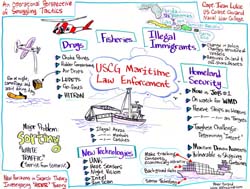
See enlargement
In illegal fisheries, the challenge lies in the laws enacted, not the inability to catch the offenders. The illegal operations are easy to spot and it is a matter of getting on board to see the illegal catch.
Illegal migrant interdiction operations mostly deal with Cuba, Haiti and other Central and South American countries. There is a massive search problem. As a humanitarian move it's in the best interest to stop the migration, because of the mass of people being moved and the amount who die in transit.
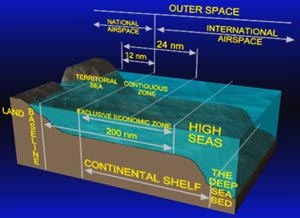
If a Santa Dominican sneaks into Puerto Rico and speaks Spanish,
it is easy to cross into American territory. Small, fast boats are
used at night to run people into Florida. One of the leading challenges
is migrant safety. Migrant activity involves hiding and the sooner
those migrants are detected, provisions can be made to pick them
up on shore. Intercepting the migrants is heart-rending, but necessary.
Most immigrants are sent back to countries where they will face
poverty and/or political persecution.
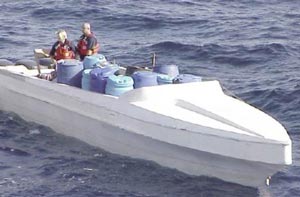
Homeland security has rapidly become a number one maritime job
for the USCG. We need to be aware of large ships with the potential
of being used as bombs, attacks on cruise ships, or as vehicles
for arms and explosives smuggling.
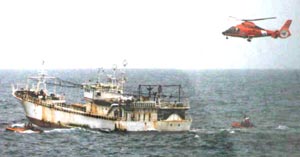
The biggest challenge is that terrorists are not readily identifiable, whereas drug smugglers are. It is very difficult to discern intent.
There are many things being done to narrow the field by enacting new laws to supervise what is being transported and loaded in the millions of shipping containers entering the country. There is a heavier personnel screening now in place.
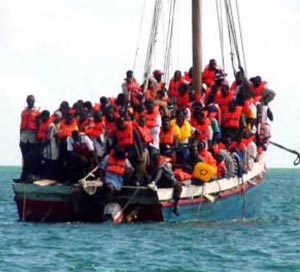
However, we still face the problem of a suicidal terrorist. There
are not enough assets and procedures in place yet to keep this threat
under control. We can't possibly look into every container that
is in a cargo hold, so we will be relying more on technology to
keep track of what is being shipped. Procedural compliance will
be one way to make headway, as well as making compliance more economically
attractive. For example, those containers which have electronic
data will clear customs quicker.
Another challenge in tracking terrorists is the “white traffic” on a Sunday afternoon in Miami's harbor. How does one discern the tourist from the traffiker or the terrorist? In our country, it will be impossible to convince the public to install GPS devices on personal, recreational boats.
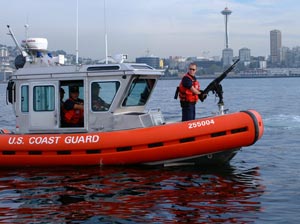
From a law enforcement perspective, anything you can do to narrow the search will increase your probability of finding what you are looking for. The Coast Guard has drastically redefined its mission and role in the last several years to address the evolving threats to our nation.
|

